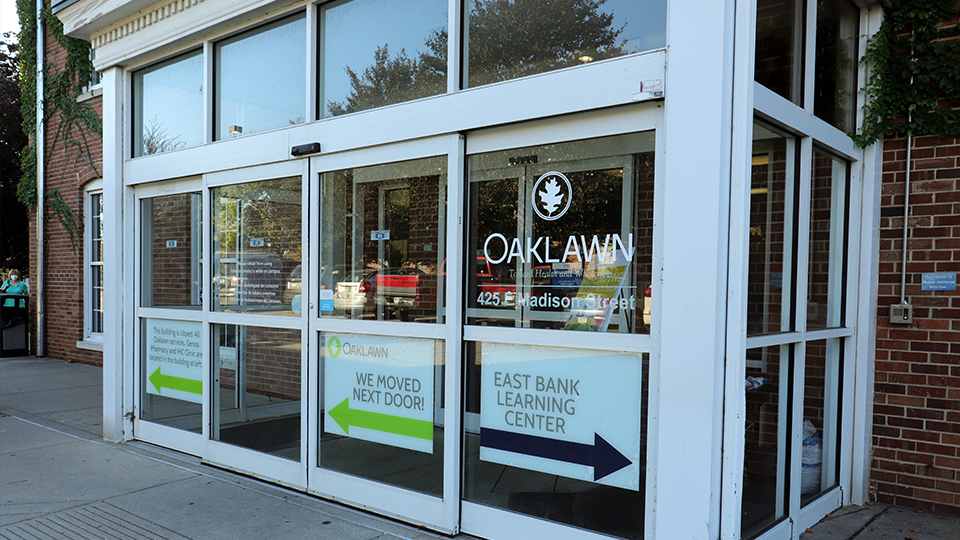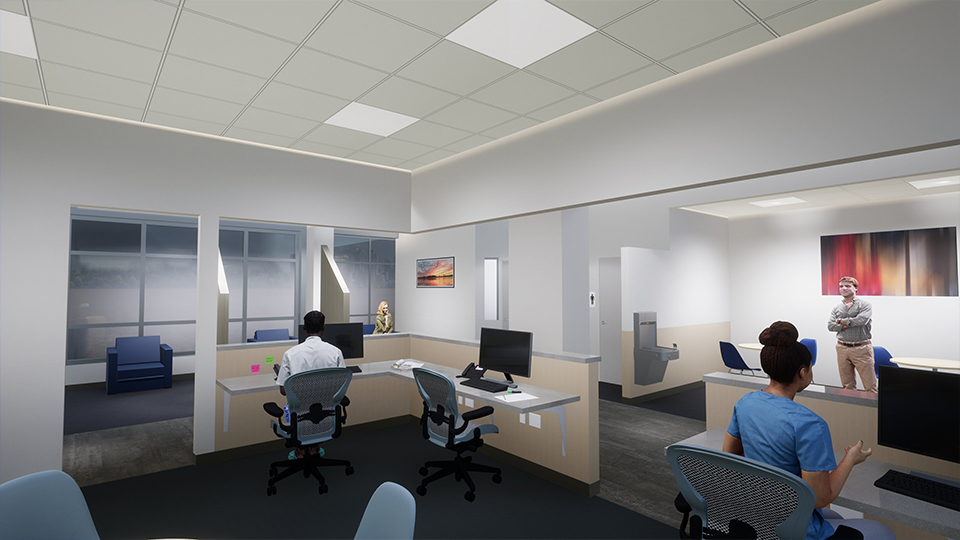Oaklawn expands into $16.2M South Bend campus with 24/7 crisis services on the way
Subscriber Benefit
As a subscriber you can listen to articles at work, in the car, or while you work out. Subscribe Now
Community leaders joined officials with mental health services provider Oaklawn last week to celebrate the opening of a new, $16.2 million campus in St. Joseph County.
The new campus — just next door to their former South Bend location and across the street from Beacon Health System’s Memorial Epworth Hospital — expands the amount of space available for Oaklawn’s mental health and addiction treatment services by 10,000 square feet.
The move to the three-story, 60,000-square foot campus comes as Oaklawn experiences record growth.
In addition to the new offices at 415 E. Madison St., Oaklawn will open the first of two planned 24/7 crisis centers this winter – bringing previously nonexistent round-the-clock mental health services to St. Joseph County.
Oaklawn CEO Laurie Nafziger discusses the services housed in Oaklawn’s new South Bend center.
Taken together, Oaklawn CEO Laurie Nafziger said, the organization’s recent projects can help remove burdens from other community services, including some which may not be fully equipped to respond to the type of mental health needs Oaklawn’s therapists and doctors specialize in.
“I hope for more appropriate care, so that when someone’s in crisis, they can get connected to the right care when they need it,” Nafziger said of Oaklawn’s growing services. “It’ll prevent unnecessary hours and dollars in the emergency rooms. It’ll prevent unnecessary jail time, and then the record that comes with having jail time. I also hope that as we’re able to do this and we’re increasingly visible in the community, it’ll work to continue to dampen down and lessen stigma so that people will ask for help.”
Oaklawn’s new South Bend campus brings more and better-organized space, Nafziger said, to support the organization’s expanding services.
Oaklawn has grown to serve 5,000 more St. Joseph County patients than when the organization first became the area’s designated Community Mental Health Center more than a decade ago.
Its St. Joseph County staff had worked out of Oaklawn’s former location — a 170-year-old former Singer sewing machine cabinet factory — since taking over operations for the now-defunct Madison Center in 2010.
Oaklawn today provides mental health and addiction services to 25,000 young people and adults from its four campuses in Elkhart, Goshen, South Bend and Mishawaka.
The new campus houses space for adult and child walk-in clinics, dedicated group therapy rooms, homeless outreach teams, mobile crisis response workers and more.

From small touches, like a new shower room for homeless clients, to strategic decisions placing related therapists, case managers and child services together on the same floor, Oaklawn’s leaders say the new center helps streamline care.
“It’s bigger, it’s better organized and it’s just beautiful,” Nafziger said, “Which is a gift to our clients and our staff to be able to do that.”
Oaklawn’s new building, purchased from Beacon, connects to its former offices via a courtyard. Some administrative offices still remain in the old building for which Nafziger said Oaklawn officials are beginning to discuss future uses, including a possible sale.
Nafziger discusses the need for continued growth of mental health crisis teams.
Alicia Sisk, a marketing and communications director for Oaklawn, said it’s likely some offices will move over to the new building with the opening of Oaklawn’s 24/7 crisis centers – one in St. Joseph County and another in Elkhart County.
The St. Joseph County center will be housed on the first floor of the Memorial Epworth Building at 420 N. Niles Ave., and the Elkhart Center will be on Oaklawn’s Goshen campus at 330 Lakeview Drive.
Members of the St. Joseph County mobile crisis team — which currently takes calls 12 hours a day from Oaklawn’s officers and responds on location to those in need of emergency mental health care — are likely to co-locate with the St. Joseph County’s crisis center and build up to continuous, 24/7 service.
The forthcoming crisis centers follow a new national model in behavioral health care: someone to call, someone to go and somewhere to go.
Rather than hospital beds, the center will be outfitted with recliners and establish a “living room” style environment for those experiencing a mental health crisis and in need of a place to de-escalate. The centers will be staffed 24/7 with doctors, nurses and therapists who can assess a patient’s needs and provide appropriate care. Nafziger says it’s a model, functioning in tandem with the mobile crisis teams, that seeks to fill gaps in emergency mental health care.
“If an adult is in crisis, however they define it, they can come, no questions asked to get in the door, and then we take the time to sort it out, de-escalate it, gather information, make a plan,” Nafziger said.

Oaklawn is looking to hire nearly two dozen to staff each of its 24/7 crisis centers – something Nafziger says has been challenging given recent workforce shortages in the health care industry. She said Oaklawn is working with higher education and K-12 partners to build health care pipelines locally.
Though St. Joseph County commissioners pulled their financial backing of the new crisis center, city officials stepped in with funding after the 2022 police shooting of a 51-year-old South Bend man with schizophrenia shone a spotlight on needs for greater access to on-demand mental health services.
The St. Joseph County and Elkhart crisis centers are each expected to cost $1.5 million annually to operate and are being paid through a combination of state and local grant dollars.
St. Joseph County’s crisis center is on track to open this winter while the Goshen center will follow behind, opening likely in mid-2024. Oaklawn is continuing a $5 million capital campaign in support of its new South Bend offices. More information is available at oaklawn.org/southbend.
